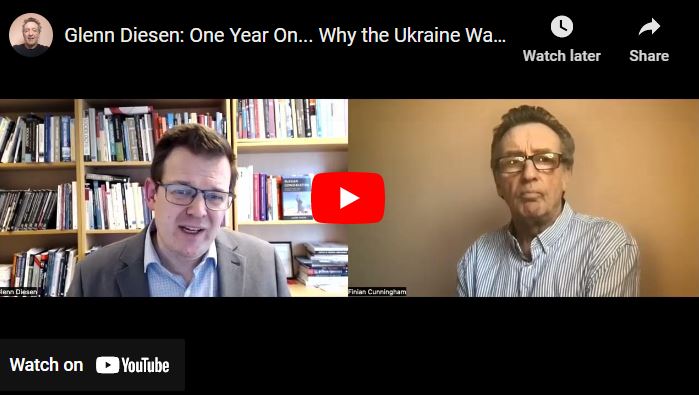Glenn Diesen: One Year On… Why the Ukraine War Spells Doom For U.S. Hegemony and the NATO Alliance

After one year of war in Ukraine, Russia has not collapsed in the dramatic way that the United States and its European NATO allies were confidently predicting.
U.S. President Joe Biden in visits to Ukraine and Poland this week hailed the “unity” of NATO and the transatlantic alliance.
The reality is the Western transatlantic alliance is showing signs of fragmenting because of the immense strain on Europe’s economy due to European governments following Washington’s hostile policy towards Russia.
Street protests across Europe are growing against NATO and governing elites seen to be servile to American policy. This is not just about the war in Ukraine. The whole Western capitalist order is shaking at its foundation, largely because of American hegemonic ambitions. The Ukraine war is merely a manifestation of underlying geopolitics.
Contrary to Western great expectations, the Russian economy is holding up strongly and its military operations in Ukraine seem to be gaining the upper hand. This is in spite of the U.S.-led NATO bloc “throwing everything they can” at Russia to defeat it, from endless supplies of weaponry to support the Kiev regime, to endless rounds of economic sanctions in an attempt to collapse the Russian economy.
Glenn Diesen is a Professor at the University of South-Eastern Norway. He is an expert in international politics and Russian foreign relations.
Diesen explains that Russia has long been preparing for confrontation with the United States and its European allies. Ever since the U.S.-backed coup in Kiev in 2014 and the Western betrayal of the 2014 and 2015 Minsk peace agreements, Moscow quietly realized that it would have to reinforce its economy to withstand the anticipated Western showdown.
Hence, Russia built up its military forces knowing that a conflict was coming. Just as importantly, Moscow took strategic steps to protect its economy by diversifying trade with the emerging Eurasian engine of global growth. Russia had resolved to abandon the centuries-old notion of focusing on Western partnerships for development and instead orientated its economic interests towards China, India, and the Global South. The West has not realized the deeper geoeconomic shifts and thus presumed that they could punish Russia economically. Biden can longer enforce the old American demand on designated enemies to “Cry Uncle”.
That explains why Russia is not breaking from Western sanctions or from the ferocious military hostility that the U.S. and its NATO have unleashed via Ukraine.
Diesen contends that the strategic confrontation embarked on by Washington against Russia (and China) will rebound by fragmenting the Western transatlantic alliance. We are already witnessing mounting public anger across the European Union against governments who have “committed economic suicide” by siding with Washington and alienating Russia as a reliable trading partner, in particular for affordable and abundant energy resources.
Washington’s Cold War mindset of “us and them”, zero-sum, perpetual conflict, and so on, is going to be its ultimate downfall as it crashes the transatlantic relationship on the altar of hegemonic ambition and imperial dominance.
The European governments have recklessly and foolishly bought into Washington’s agenda for pursuing Western hegemony. In doing so, European elites are destroying their own national economies and provoking growing public discontent and protests. European states and the European Union itself are in danger of collapsing from economic ruination, not Russia. This, in turn, is fomenting popular anger towards Washington and undermining the supposed bedrock of Western unity.
President Biden’s rhetoric about “Western unity” seems to be more hubris before the fall than a reflection of reality.
The West has miscalculated the impact of the Ukraine war because it failed to understand the emergence of the multipolar global economy and how their economic sanctions have no longer the coercive power they once had.
Russia is not backing down because it doesn’t have to. That cannot be said for the U.S. and its European allies who are increasingly looking at a weakened geopolitical position.
 TheAltWorld
TheAltWorld 
0 thoughts on “Glenn Diesen: One Year On… Why the Ukraine War Spells Doom For U.S. Hegemony and the NATO Alliance”